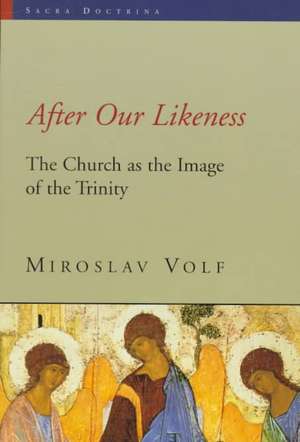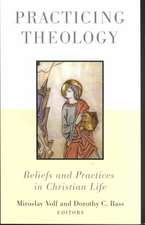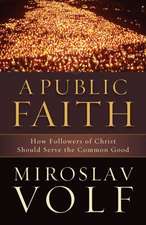After Our Likeness: The Church as the Image of the Trinity: Sacra Doctrina: Christian Theology for a Postmodern Age
Autor Miroslav Volfen Limba Engleză Paperback – 30 sep 1997
Vezi toate premiile Carte premiată
Volf seeks to counter the tendencies toward individualism in Protestant ecclesiology and to suggest a viable understanding of the church in which both person and community are given their proper due. In the process he engages in a sustained and critical ecumenical dialogue with the Catholic and Orthodox ecclesiologies of Joseph Cardinal Ratzinger and the metropolitan John Zizioulas. The result is a brilliant ecumenical study that spells out a vision of the church as an image of the triune God.
Preț: 203.14 lei
Nou
Puncte Express: 305
Preț estimativ în valută:
38.88€ • 40.44$ • 32.58£
38.88€ • 40.44$ • 32.58£
Carte disponibilă
Livrare economică 20 februarie-06 martie
Preluare comenzi: 021 569.72.76
Specificații
ISBN-13: 9780802844408
ISBN-10: 0802844405
Pagini: 326
Dimensiuni: 160 x 235 x 22 mm
Greutate: 0.49 kg
Ediția:New.
Editura: William B. Eerdmans Publishing Company
Seria Sacra Doctrina: Christian Theology for a Postmodern Age
ISBN-10: 0802844405
Pagini: 326
Dimensiuni: 160 x 235 x 22 mm
Greutate: 0.49 kg
Ediția:New.
Editura: William B. Eerdmans Publishing Company
Seria Sacra Doctrina: Christian Theology for a Postmodern Age
Descriere
This inaugural volume in the Sacra Doctrina series explores the relationship between persons and community in Christian theology. The focus is the community of grace, the Christian church. The point of departure is the thought of the first Baptist, John Smyth, and the notion of church as "gathered community" that he shared with Radical Reformers. Miroslav Volf seeks to counter the tendencies toward individualism in Protestant ecclesiology and to suggest a viable understanding of the church in which both person and community are given their proper due. In the process, Volf engages in a sustained and critical ecumenical dialogue with the Catholic and Orthodox ecclesiologies of Joseph Cardinal Ratzinger and the metropolitan John Zizioulas. The result is a brilliant ecumenical study that spells out a vision of the church as an image of the triune God.
Recenzii
Interpretation"In this substantial volume, Volf explores the relationship between trinitarian theologies and their corresponding ecclesiologies. His thesis is that a Free Church trinitarian ecclesiology is not only dogmatically defensible but in certain social situations may prove to be superior to other ecclesiologies. . . . A careful theology with broad ecumenical interests, Volf's exposition of Ratzinger and Zizioulas is exemplary, and his own constructive arguments make a significant contribution to contemporary theology."Modern Theology"This book richly deserves to be read beyond purely academic circles. By reformulating Free Church ecclesiology, Volf offers anyone interested in ecumenical dialogue a new touchstone for understanding many of those traditions that continue to be excluded (and to exclude themselves) from ecumenical discussions."Theological Studies"Creative, original, and compelling in its organization and logic. Volf's study deals with a number of areas that still need further critical reflection not only in Orthodox and Catholic ecclesiologies, but also in those of the Free Churches."Anglican Theological Review"One of the most important contributions made to the study of ecclesiology, not only within Protestant theology where good ecclesiology is often scarce, but also in the field of the ecumenical study of the Church."Journal of Ecumenical Studies"Volf offers a significant contribution to the debate from a free-church point of view, grounded in biblical and patristic research, but taking account of the ecumenical studies and contemporary systematic contributions of Moltmann and Pannenberg, especially their eschatological orientations. The author's own background, in both the Croatian context where Catholic and Orthodox churches dominate and working within the evangelical scholarly community, gives his research and ecumenical breadth and uniqueness of point of view that makes its contribution to the discussion particularly important."Currents in
Premii
- Christianity Today Book Award Winner, 1999









